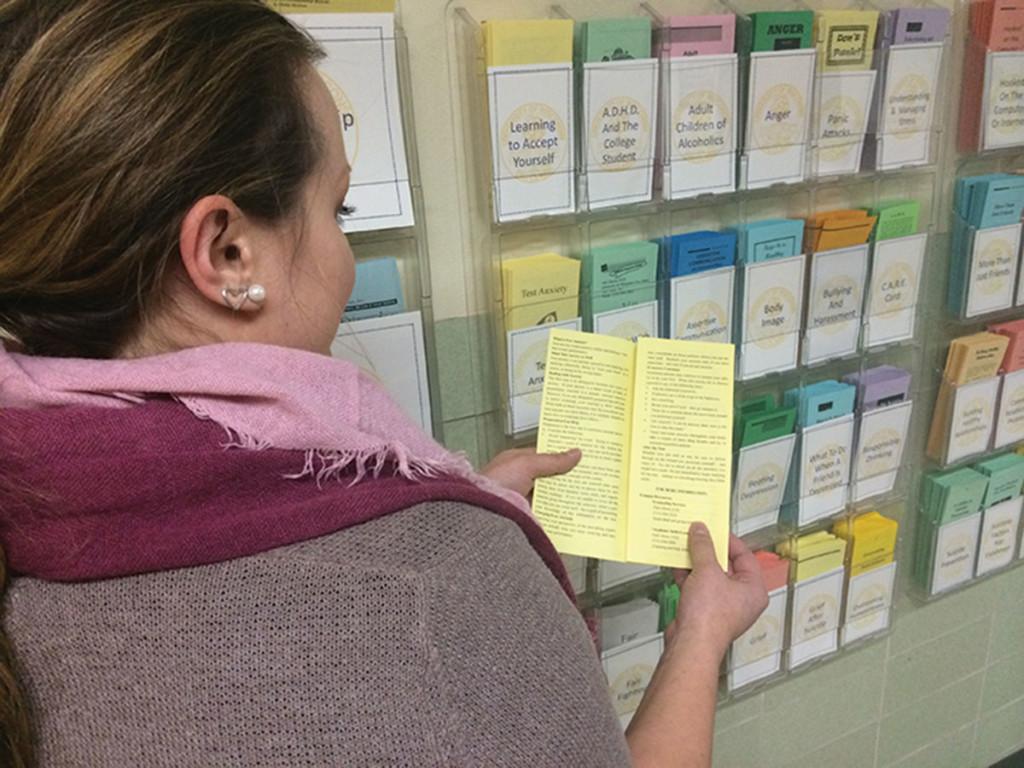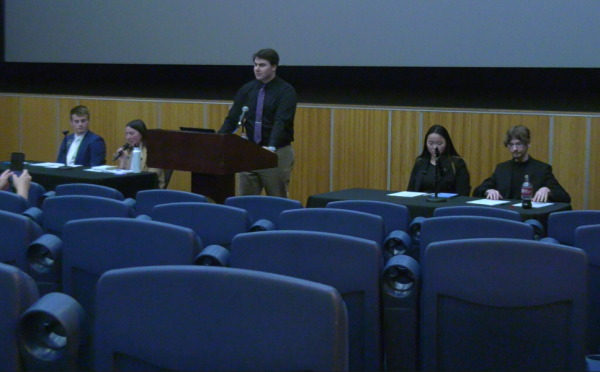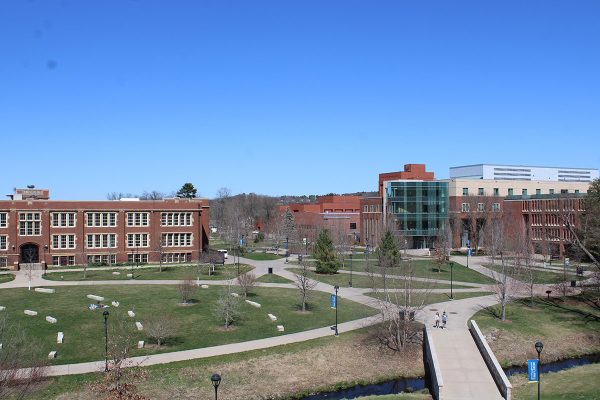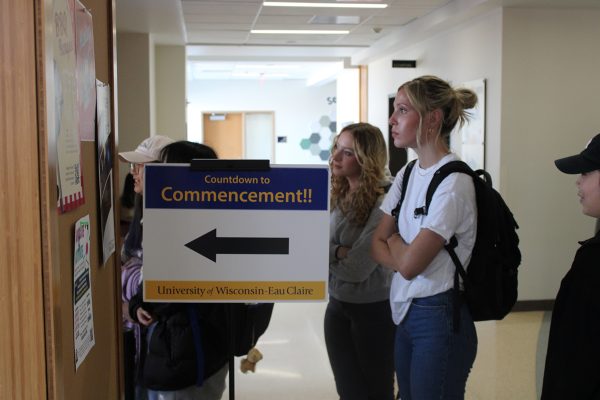Counseling achievable for low-income adults
Hotlines, university provide options for those unable to pay for counseling
Photo by Kristina Bornholtz
Ashley Galoff, the Master’s Level intern at Counseling Services at UW-Eau Claire, explains a pamphlet discussing the signs of test anxiety. Counseling for test anxiety is among the services provided by the free center located in Old Library, making it a viable option for low-income students.
February 12, 2015
On a chilly Wednesday morning in early February, the patrons of Sojourner House, a homeless shelter operated by Catholic Charities, received a visit from an advocate sent to help them conquer the mental and physical obstacles that accompany low-income adults.
This is a weekly ritual for Nadine Jentzsch, a financial wellness advocate from St. Lawrence Community Services, also operated by Catholic Charities. Jentzsch spends Wednesday mornings in one-on-one sessions with those seeking shelter at Sojourner House in hopes of finding a sense of stability, financially and otherwise.
“For some people, this is a lifestyle choice,” Jentzsch said of her low-income clients. “But for those who didn’t choose (financial instability), I have to find out what the barriers are to getting them back on their feet. I have to find ways to go around those barriers or knock them down.”
Jentzsch is one of six advocates working through St. Lawrence Community Services to bring security to the low-income sector of the Chippewa Valley. About 16 percent of residents in Eau Claire County live below the poverty line, according to the U.S. Census Bureau. That means about 6,500 residents may not have money to afford counseling.
“(The most rewarding part of my job) is when the lights come on for somebody,” Jentzsch said.
The low-income label isn’t exclusive to those who are homeless or seeking employment here in Eau Claire. Twenty percent of undergraduates at UW-Eau Claire identify as low-income, according to a 2014 report by College Portrait.
In 2011, the American College Health Association-National College Health Assessment found that around 30 percent of students enrolled at a university said they had felt “so depressed that it was difficult to function” at least once in the last year. And while a rising number of students feeldepressed, costs remain high — in some cases, upward of $200, according to Good Therapy.
Jeff Erger, sociology professor, said that if these students don’t seek help, it’s likely that they will turn to destructive behaviors to cope.
“When stress builds up, it needs to be worked out,” Erger said. “Undiagnosed disorders manifest in negative behaviors, things like smoking, drinking and acting out.”
Erger said that if mental health conditions have already been diagnosed, it’s easier for the patient to go online and research best treatments and seek help that way. But for undiagnosed people, it can be a shot in the dark.
Great Rivers provides a free information and referral crisis line to the western Wisconsin, southeast Minnesota and northeast Iowa regions, available 24 hours a day, seven days a week.
The dispatchers and counselors available by dialing 211 are trained to talk callers through suicidal thoughts and sexual assault, and also provide information about resources in the area.
Luke Feide, a counselor and case manager at univeristy Counseling Services, said Great Rivers is a good, free option, especially for those afraid of booking an appointment with a counselor.
“There’s still that stigma about going to counseling,” Feide said. “The hotlines are fantastic. I know some folks on the other ends of those lines and they are really skilled people who can help navigate things.”
Counseling Services is an option for students enrolled at the university with costs included in segregated fees and no co-pays for visits. According to Feide, Counseling Services saw 1,026 unique clients last academic year in their office in Old Library.
“I think (free counseling services) are important to any campus,” Feide said. “At this age, there is a lot of onset mental illness. People may not have thought they were depressed before, but they start to realize they are having some pretty significant players.”
Feide said depression and anxiety are the top two diagnoses that come out of visits to Counseling Services. Students can set up bi-monthly appointments after an initial “triage” appointment, where they connect with a provider and go through basic assessment. This is a regular schedule that students who choose to seek help through counseling services can use until graduation.
Post-graduation, however, students are on their own, Feide said.
Counseling Services work to set students up with another provider outside the university.
In Eau Claire, Feide said the top two options are Mayo Clinic and Sacred Heart, where payment can be largely offset by charitable donations to the clinic. When students are moving out of town, he works with them to find good options in their new city.
“I always have a form for them to look at for them to navigate their insurance,” he said. “A lot of students have never had to do that before. It’s not always easy to do.”
Nicole Crusing, freshman accounting major, said she wasn’t aware that counseling services were available.
“I think it’s a really good thing to have on campus for people who couldn’t go and find one on their own, but they have someone here to talk to,” she said.
Counseling Services at the university are open Monday, Tuesday, Thursday and Friday from 8 a.m. – 4:30 p.m., and stay open until 7 p.m. on Wednesday. To schedule an appointment, call 715-836-5521. If you are experiencing suicidal thoughts, domestic violence, or any other crisis, call Great Rivers by dialing 211.











